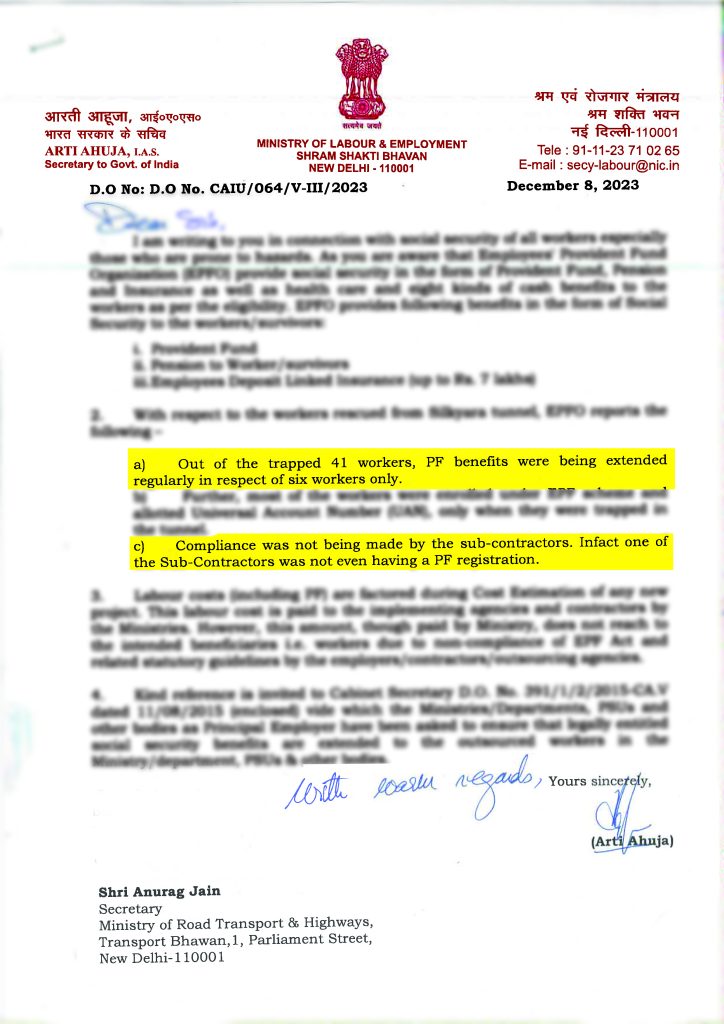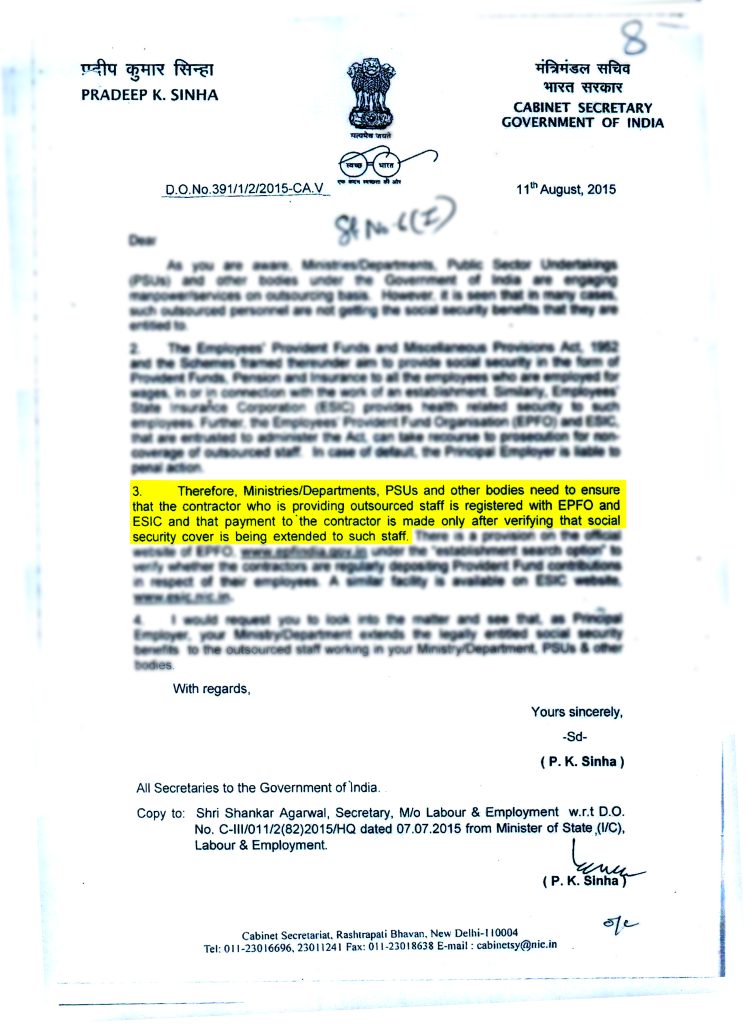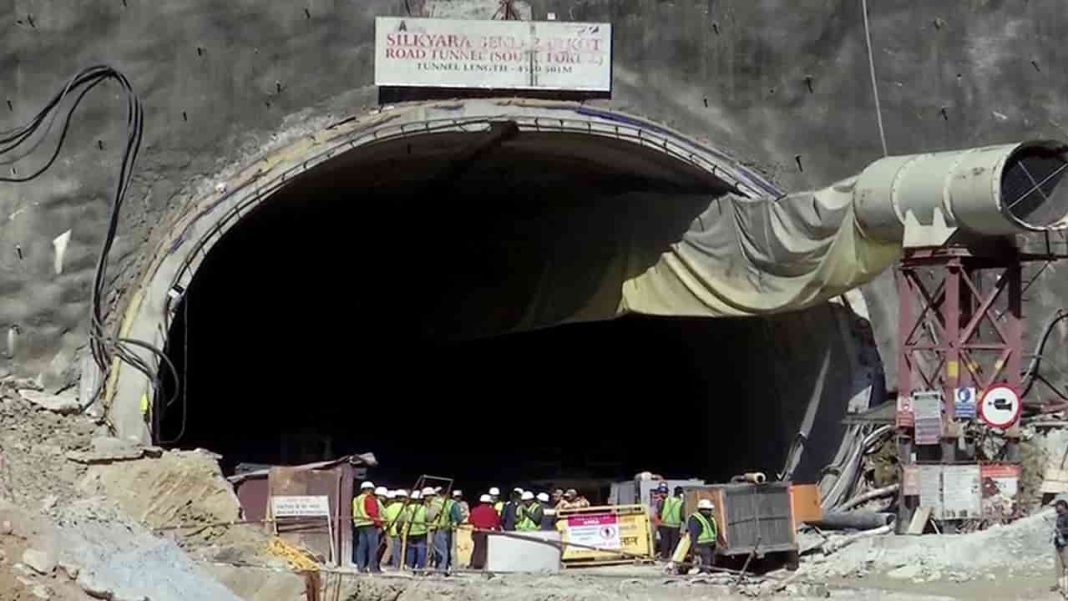Documents with India Legal shockingly reveal that only six of the 41 workers trapped inside were members of EPF or had insurance. Worse, 26 were provided PF and other papers while trapped in an attempt to stop any blame-game
By Suresh Kumar
“The ‘unskilled’ or ‘disposable’ labourer is never able to accumulate additional utility or human capital even after many years of experience. His only capital—the body—is treated as a disposable and inanimate piece of machinery that loses its value in order to generate value for the nation,” wrote Anu Sabhlok, Hoiwan Cheung and Yogesh Mishra in the Economic & Political Weekly, December 19, 2015.
This sad state of affairs continues even today in India and is evident in various cases where labourers have lost their lives while at work. Consider these cases:
- On May 28, 2023, four out of six labourers died during the construction of Nichitpur Railway Crossing under Dhanbad Division of the East Central Railway.
- On August 23, 2023, at the Bairabi-Sairang rail project, near Sairang in Aizawl district of Mizoram, 23 workers lost their lives in an accident.
- On November 12, 2023, a part of the Silkyara-Dandalgaon tunnel under construction on the Brahmakhal-Yamunotri highway in Uttarakhand collapsed, trapping 41 workers inside. Their luck was good and all were saved.
All three were government projects and most of the workers, including the victims of different incidents or accidents, were not members of the Employees Provident Fund (EPF) scheme. This means that they were forced to work in hazardous conditions with no insurance or any other coverage, a standard pre-requisite for securing work under any government tender.
The Uttarkashi fiasco
Regarding this accident which riveted and shocked a tense nation, India Legal is in possession of documents which show how precautions were thrown to the wind when it came to workers’ welfare. Navayuga Engineering Company (NEC) managed to secure a massive tender floated by the National Highway and Infrastructure Development Corporation Limited (NHIDCL) to bore and construct the 4.5-km Silkyara-Dandalgaon tunnel as part of the Char Dham All Weather Road Project. However, it didn’t bother to get the employees registered with EPF or the Employees’ State Insurance Corporation (ESIC) schemes.

As the tunnel collapsed, it was found that only six of the 41 employees trapped inside were registered with EPF. This was a blatantly illegal act, with NEC and the principal employer NHIDCL being at fault. India Legal is in possession of documents which reveal the hectic parleys which took place to get these workers the necessary papers and avoid any blame game.
How it began
The disaster began around 5:30 am on November 12, 2023, the day Diwali was being celebrated all over the country. News came in that a part of the Silkyara-Dandalgaon tunnel under construction on Brahmakhal-Yamunotri highway had collapsed and 41 labourers were trapped inside. As the news spread like wildfire, Chief Labour Commissioner (Central), Delhi, directed the Deputy Chief Labour Commissioner, Dehradun, to submit a report on the matter. The Dehradun office sent an interim report on November 13 confirming that within the Char Dham All Weather Road Project, a 4.5-km tunnel was being constructed. A part of it had collapsed due to a landslide and 41 labourers were trapped inside the cavernous mountain.
It was also revealed that the workers trapped were residents of Uttar Pradesh, Bihar, Jharkhand, West Bengal, Odisha, Assam and Himachal Pradesh. The report mentioned that all the workers were safe and work was going on to save them.
Another letter was sent from the Chief Labour Commissioner (Central), to the Deputy Chief Labour Commissioner, Dehradun, on November 20, in which he was directed to visit the incident site on November 21 and ensure the following:
A. In addition to regular wages, employers should ensure payment of overtime to workers for the period they were trapped in the tunnel.
B. It should be ensured that if any salary payment was pending, it should be released, and a part of it sent to the family of the worker with the consent of the employer.
C. If necessary, one or two months’ salary should be provided to the workers by the employer.
D. If other workers associated with this project have suspended work due to this incident, their rights should also be protected from the employer through legal means.
E. All employers involved in construction in this area should be instructed by the regional head to ensure the use of safety equipment, and additional monitoring of workers working in risky areas should be done.
A letter with the above instructions was also sent by the Regional Labour Commissioner to the Labour Ministry.
Backroom activity
Between November 12 and 24, urgent phone calls and messages via email and WhatsApp took place between the Ministry of Labour and Employment, the Chief Labour Commissioner (Central) and the Deputy Chief Labour Commissioner, Dehradun. Copies of these conversations are available with India Legal, and many are reproduced alongside.
It was revealed that only six of the workers were members of the EPF.
This was mentioned in a letter sent by Aarti Ahuja, Secretary, Ministry of Labour, to Anurag Jain, Secretary, Ministry of Road Transport and Highways, on December 8, 2023.
A similar letter was sent to Manoj Joshi, Secretary, Ministry of Building and Urban Development, on December 8, 2023. In the letter, an important notice/letter from the Cabinet Secretary (D.O. No. 391/1/2/2015-CA.V dated 11/08/2015) was quoted. That notice/mail declared that all ministries/ departments, PSUs and other institutions were the main employers, and the contract-based labourers were employed in these institutions. Of course, such a letter would not take away the responsibility and culpability of the company—the contractors—actually employing the labourers.
The main employers were said to be responsible for social security facilities. It was also mentioned in these provisions that if the contractors were not able to pay salaries to the contract or contractual workers, the responsibility would be on the main employer (Ministry/Department, PSU and other related institutions).
The shocking truth
Between November 15 and 23, even as the workers were trapped in the tunnel, 26 of them were made members of the EPF. This was done in post-haste, just to avoid the blame-game that would have ensued had any of the workers succumbed inside the tunnel. It is not clear if any action has been taken against the ministry or department responsible for the major lapses as mentioned above.

There is a provision to provide all the facilities with the EPF under the EPF & MP Act, 1952, and the Contract Labour (Regulation and Abolition) Act, 1970. This applies to employees with a monthly salary of less than Rs 15,000. How did the ministry give permission to any company to get the work done when such basic guidelines had been flouted?
The Cabinet Secretary’s D.O. No. 391/1/2/2015-CA.V dated 11/08/2015, Ministries/Departments, PSUs and other related institutions continue to violate the order of the government of India, jeopardising the lives of workers. And while everybody within the administrative system is aware of the developments, it waits to be seen as to what action, if any, will be taken against the perpetrators of such crimes.


